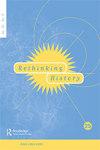公共历史与跨媒体叙事冲突
IF 0.8
2区 历史学
Q1 HISTORY
引用次数: 1
摘要
事件的历史可以从多个角度讲述,很少只有一个线性叙事或对过去的单一解释。本文采用跨学科的方法来解释公共历史中共享权力的概念如何在媒体研究的背景下应用于跨媒体讲故事,以解决历史事件的冲突叙事。跨媒体叙事为针对不同受众提供了更多机会,并为官方主流对历史事件的解释提供了替代方案,甚至可能是相互矛盾的解释。这是通过公众参与冲突叙事发展的三种主要方法实现的,这些叙事可以通过各种不同的媒体呈现。在与不同公众分享跨媒体叙事创作的权威方面,理论上的挑战从强有力的控制到很少的控制(即激进的信任)。因此,我们讨论了一系列方法论,这些方法论可以在未来的研究项目中战略性地使用,这些研究项目希望在历史跨媒体叙事的发展中与不同的公众分享权威,并有相互冲突的解释。这种方法在种族隔离、歧视、身份认同、政治变革或文化战争的背景下尤其重要。本文章由计算机程序翻译,如有差异,请以英文原文为准。
Public history and transmedia storytelling for conflicting narratives
ABSTRACT Histories of events can be told from multiple perspectives, and there is rarely just one linear narrative or a single interpretation of the past. This paper takes an interdisciplinary approach to explain how the concept of shared authority in public history can be applied to transmedia storytelling, in the context of media studies, to address conflicting narratives on historical events. Transmedia narratives allow for more opportunities to target different audiences and offer alternatives, and perhaps conflicting interpretations, to official mainstream interpretations of historical events. This is achieved through three primary methods of public participation in the development of conflicting narratives which can be presented through a variety of different media. The theoretical challenges in sharing authority of transmedia narrative creation with different publics ranges from strong to little control (i.e. radical trust). Thus, we discuss a series of methodologies that can be strategically used in future research projects that wish to share authority with different publics in the development of historical transmedia narratives with conflicting interpretations. This approach can be particularly relevant in contexts of segregation, discrimination, identity, political changes or cultural wars.
求助全文
通过发布文献求助,成功后即可免费获取论文全文。
去求助
来源期刊

Rethinking History
Multiple-
CiteScore
1.20
自引率
0.00%
发文量
26
期刊介绍:
This acclaimed journal allows historians in a broad range of specialities to experiment with new ways of presenting and interpreting history. Rethinking History challenges the accepted ways of doing history and rethinks the traditional paradigms, providing a unique forum in which practitioners and theorists can debate and expand the boundaries of the discipline.
 求助内容:
求助内容: 应助结果提醒方式:
应助结果提醒方式:


